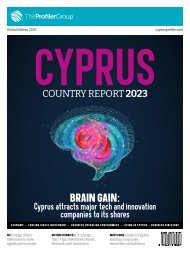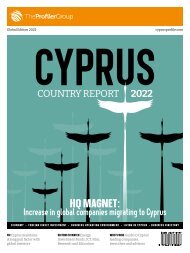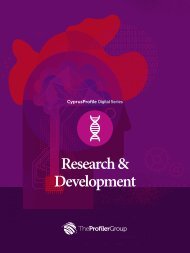2020 Cyprus Country Report
The 2020 Cyprus Country Report features in-depth articles on the economy, foreign direct investment, international trade and headquartering as well as detailed sector profiles and insights from Cyprus’ 100 most influential political, economic and business leaders shaping the future of their country and its industries.
The 2020 Cyprus Country Report features in-depth articles on the economy, foreign direct investment, international trade and headquartering as well as detailed sector profiles and insights from Cyprus’ 100 most influential political, economic and business leaders shaping the future of their country and its industries.
You also want an ePaper? Increase the reach of your titles
YUMPU automatically turns print PDFs into web optimized ePapers that Google loves.
Technology & Start-Ups<br />
Sector Profile<br />
CORONA IMPACT<br />
Although the coronavirus pandemic has had<br />
devastating consequences on the world economy,<br />
with <strong>Cyprus</strong> also feeling its effects, there has been<br />
a silver lining in the situation speeding up digital<br />
and technological advancements.<br />
In <strong>Cyprus</strong> the pandemic forced the government<br />
to spin into action and adapt to the needs<br />
and imperatives imposed by crisis management<br />
in the post-corona era. The long-term action plan<br />
to automate public services was sped up with<br />
the urgency to deliver these priorities faster for<br />
the benefit of individuals and businesses. What<br />
would have taken a few years to achieve has been<br />
pushed to the top of the agenda with the aim to<br />
complete the targets in a matter of months.<br />
Substantial government funds are now allocated<br />
to support the rapid development of e-government.<br />
Thanks to around €350 million made<br />
available, <strong>Cyprus</strong> will be able to implement 160<br />
e-government services – considerably more than<br />
the 50 deemed essential.<br />
Even before the pandemic crisis, the government<br />
had already set in motion plans to reinforce<br />
the tech sector in <strong>Cyprus</strong>, by creating a unique<br />
visa to host services from abroad and in attracting<br />
skilled Cypriots from the diaspora to return<br />
to <strong>Cyprus</strong>, and to bring in new technology and<br />
know-how that may not be found on the island.<br />
DEEPENING THE TALENT POOL<br />
<strong>Cyprus</strong> already has an extensive and internationally<br />
recognised pool of skilled professionals in financial<br />
and business services, but where this pool<br />
still remains relatively shallow is in the tech sector<br />
– a gap the country urgently needs to bridge if it<br />
wants to develop its IT landscape. <strong>Cyprus</strong> has attracted<br />
more than 7,000 IT pros, the majority of<br />
whom are seasoned and older professionals, not<br />
young graduates and execs who are a crucial demographic<br />
to secure the future of the sector.<br />
Statistics on this subject are formidable. For<br />
example, although <strong>Cyprus</strong> has the second-highest<br />
tertiary educational attainment rate in the EU,<br />
it has one of the lowest proportions of Science,<br />
Technology, Engineering, and Mathematics<br />
(STEM) graduates at a time when nearly 46% of<br />
new jobs created in the EU require STEM skills,<br />
according to the EU Education and Training<br />
Monitor for 2019. There are many unskilled<br />
workers in the local labour force. Specifically,<br />
these are individuals aged 25-64 who are employees,<br />
self-employed or family workers. The proportions<br />
of those with low digital skills (32%) or<br />
only basic digital skills (34%) are higher than the<br />
EU average of 25% and 30% respectively. Those<br />
reporting above-basic digital skills are fewer in<br />
<strong>Cyprus</strong> (22%) than across the EU (36%).<br />
The tech-talent shortage is a growing issue<br />
and challenge worldwide. The <strong>Cyprus</strong> government<br />
has recognised this as a key concern given<br />
the growing importance of digital technologies<br />
and artificial intelligence in the workplace. An<br />
ever-increasing sector, the field of information<br />
technology has a definite shortage in the supply<br />
of those who can work in the field, such as coders.<br />
Despite <strong>Cyprus</strong> already being a tech hub, industry<br />
experts note the need to increase the supply<br />
of competent employees to meet the demands of<br />
tech companies relocating to the island.<br />
The education sector has adapted to this reality<br />
introducing curricula to supply more skilled<br />
graduates to the labour market. The local universities<br />
provide excellent bachelor and masters programmes<br />
in computer sciences and technology,<br />
consistently producing tech-savvy candidates<br />
to join the ranks of some of the world’s leading<br />
ICT companies. For example, the University of<br />
Nicosia (UNIC) broke new ground in university<br />
adoption of blockchain technology and offers the<br />
first certified online blockchain course (MOOC)<br />
and the world’s first master’s degree for digital<br />
currencies. More than 25,000 students have taken<br />
the MOOC and over 500 students have enrolled<br />
in the MSc in digital currencies.<br />
<strong>Cyprus</strong> has also established several Digital<br />
Innovation Hubs (DIHs) such as the CYRIC<br />
Digital Innovation Hub, the KIOS Innovation<br />
Hub, the Robotics Control and Decision<br />
Systems (RCDS) Lab at the <strong>Cyprus</strong> University of<br />
Technology, and the Entrepreneurship Centre at<br />
the University of <strong>Cyprus</strong>. These DIHs are active<br />
in various market segments, such as agriculture,<br />
health, construction, transport, manufacturing<br />
and energy, and in a wide range of technological<br />
areas, including AI, Big Data, cloud computing<br />
and cybersecurity. The AI Expert Group considers<br />
the creation of a (virtual) AI DIH with dedicated<br />
AI research programs that could serve as a<br />
platform where the scientific and business community<br />
could access and share knowledge.<br />
To entice more<br />
international talent from<br />
non-EU countries to launch<br />
innovative ventures, <strong>Cyprus</strong><br />
has extended its Start-Up<br />
Visa scheme until May 2021.<br />
<strong>Cyprus</strong> has taken<br />
a firm stance<br />
in establishing<br />
AI as a driving<br />
force for growth<br />
and increased<br />
productivity, and<br />
an opportunity<br />
to transform<br />
its economy.<br />
130 <strong>Country</strong> <strong>Report</strong> CYPRUS <strong>2020</strong>

















